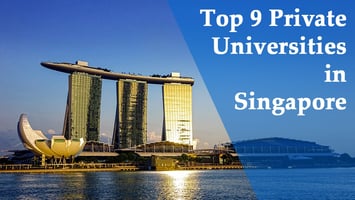Private universities in Singapore are referred to those foreign and international universities with...
Singapore’s Six Public Universities
Singapore has six public universities offering different disciplines and programmes will lead to higher education degrees such as bachelor degree, master degree, doctoral degrees and graduate diplomas. These universities are funded by the government and open to both Singaporean and foreign students.
National University of Singapore (NUS)
The National University of Singapore (NUS) is the first autonomous and research university in Singapore. It is a public university established in 1905 as former King Edward VII College of Medicine, and was established with the merger of the University of Singapore and Nanyang University in 1980.
NUS is a leading global university also a premier university in Asia. In recent years of all world reputed university ranking systems, NUS remain in the world top 100 universities. It also has particular research strength in fields of engineering, environmental studies and physical science.
Rankings of National University of Singapore (NUS)
| Quacquarelli Symonds (QS) World University Rankings | Rank | Times Higher Education (THE) World University Rankings | Rank | U.S. News & World Report | Rank | Academic Ranking of World Universities (ARWU) | Rank |
|---|---|---|---|---|---|---|---|
| QS World University Ranking 2020 | 11 | THE World University Ranking 2019 | 23 | Best Global Universities Rankings 2019 | 38 | Academic Ranking of World Universities Ranking 2019 | 67 |
| QS Asian University Rankings 2019 | 1 | THE Asia University Rankings 2019 | 2 | N.A | N.A | N.A | N.A |
| QS Graduate Employability Ranking 2019 | 33 | THE World Reputation Ranking 2019 | 24 | N.A | N.A | N.A | N.A |
Till today, NUS has 17 schools offers over 383 different courses and programmes which lead to higher education degrees such as bachelor degree, master degree, doctoral degrees and graduate diplomas.
Nanyang Technological University (NTU)
Nanyang Technological University is the second-largest university in Singapore. It is established in 1955 as former Nanyang University, and formed as NTU after the merge with National Institution of Education.
NTU has four major colleges, a medical school established in collaborating with Imperial College London, and host four autonomous research and educational institutes. They are:
- College of Engineering
- College of Business (Nanyang Business School)
- College of Humanities, Arts, and Social Sciences
- College of Science
- Lee Kong Chian School of Medicine (partnership with Imperial College London)
- Rajaratnam Institute for International Relations
- National Institute of Education
- Singapore Earth Observation and Research Institute
- Singapore Environmental Bioengineering
NTU’s college of engineering is one of world largest engineering college. The MBA programme offered by the college of business (Nanyang Business School) is the world top 50 MBAs. The College of Science is the only science college in Singapore offering an honours degree in science, mathematics and mathematics science.
Rankings for Nanyang Technological University (NTU)
| Quacquarelli Symonds (QS) World University Rankings | Rank | Times Higher Education (THE) World University Rankings | Rank | U.S. News & World Report | Rank | Academic Ranking of World Universities (ARWU) | Rank |
|---|---|---|---|---|---|---|---|
| QS World University Ranking 2020 | 11 | THE World University Ranking 2019 | 51 | Best Global Universities Rankings 2019 | 49 | Academic Ranking of World Universities Ranking 2019 | 73 |
| QS Asian University Rankings 2019 | 3 | THE Asia University Rankings 2019 | 6 | ||||
| QS Top 50 Under 50 2020 | 1 | THE Young University Rankings 2019 | 3 | ||||
| THE World Reputation Ranking 2019 | 51-60 |
Singapore Management University (SMU)
Singapore Management University is established in 2000, It is Singapore’s third autonomous university. SMU was launched in collaboration with the Wharton School of the University of Pennsylvania which one of the world top business school. SMU is aiming to establish new frontiers in the business education for Singapore and Asia.
Different from other public universities in Singapore, SMU adopted the course credit system similar from American universities, and also the seminar-based teaching method.
Although SMU is a young university less than 20 years of history, it already at the forefront of world reputed university ranking systems. The Lee Kong Chian School of Business is the first and only triple-accredited business school in Singapore.
Rankings for Singapore Management University (SMU)
| Overall Ranking | Rank | Subject Ranking | Rank |
|---|---|---|---|
| Quacquarelli Symonds (QS) World University Rankings | U.S. News & World Report | ||
| QS World University Ranking 2020 | 477 | Best Global Universities 2019 for Economics and Business | 75 |
| QS Asian University Rankings 2019 | 78 | ||
| QS Top 50 Under 50 2020 | 71-80 |
All SMU students have the opportunities to enrol in overseas exchange programmes, the partner universities including the world top universities such as Carnegie Mellon University, the Wharton School in the University of Pennsylvania etc. Besides that, SMU students can also take elective models that suit their needs across schools to pursue a second major. With these benefits, it can help SMU graduates gain more and better career opportunities.
As of today, SMU comprised six schools offering undergraduate, graduate, and PhD programmes, the schools are:
- Lee Kong Chian School of Business
- School of Accountancy
- School of Economic
- School of Information Systems
- School of Law
- School of Social Science
Singapore University of Technology and Design (SUTD)
Singapore University of Technology and Design founded in 2009, it is the fourth autonomous and public university in Singapore after NUS, NTU and SMU.
Different from other public universities in Singapore, students can complete degree programmes in 3.5 years. Coupled with the academic terms starts in May, ahead of other universities which starts in September. SUTD students can graduate eight months earlier than the same batch of students.
In addition, starting from the 2nd academic year, SUTD students will have the Independent Academic Period. In this period, students have the opportunities to the courses outside their specialization or participate in the Internship Preparation Plan which allows students to communicate with instructors from the industry to help them prepare for the workplace ahead.
SUTD still is a young university and need time to have enough graduates to ranked in the global ranking system. SUTD has a strong connection and partnership with world top universities. It is established in collaboration with Massachusetts Institute of Technology (MIT) and Zhejiang University.
Rankings for Singapore University of Technology & Design (SUTD)
| Overall Ranking | Rank | Subject Ranking | Rank |
|---|---|---|---|
| Academic Ranking of World Universities (ARWU) | U.S. News & World Report | ||
| Academic Ranking of World Universities Ranking 2019 | 801-900 | Best Global Universities 2019 for Computer Science | 38 |
| Best Global Universities 2019 for Engineering | 316 | ||
| Best Global Universities 2019 for Physics | 582 |
SUTD offers undergraduate and postgraduate programmes in five different areas:
- Architecture and Sustainable Design
- Engineering Product Development
- Engineering Systems and Design
- Information Systems Technology and Design
- Humanities, Arts and Social Sciences
Singapore Institute of Technology (SIT)
Singapore Institution of Technology established in 2009. It is the fifth autonomous university in Singapore, also the first applied learning university in Singapore.
SIT is primarily intended for students who have graduated with an appropriate diploma from one of the Polytechnics in Singapore. Now, SIT also accepting students from Junior colleges in Singapore and students with other international qualifications.
Currently, SIT offers fifteen undergraduate programmes award by themselves, also offering thirty-four undergraduate programmes award jointly or with its nine reputable overseas university partners. Those degrees are grouped into five clusters, they are Engineering, Chemical Engineering and Food Technology, Infocomm Technology, Health and Social Sciences, as well as Design and Specialized Businesses.
SIT now hosting its students in five campuses located in the five polytechnics in Singapore. It going to move to its new Punggol North campus in 2023.
As a young university, SIT does no show much on the university rankings yet, it is doesn’t means the university is a bad university. University rankings usually take academic reputation, Research citations and papers published, those important factors heavily to measure the rank of a university. SIT just started to offer its own degree programmes in 2014, it is still cannot be measured.
Currently, the majority of SIT degree programmes are offered by the partnership with reputable overseas universities. Those universities either are the world top-ranking university or are the top tier of its subject field.
For degree programmes awarded SIT itself, it has the Integrated Work Study Programme (IWSP). This programme is compulsory and will be graded, though this programme, students will get a chance to do an internship with a relevant industry partner.
Singapore University of Social Sciences (SUSS)
Singapore University of Social Sciences sixth autonomous and youngest university in Singapore. It is established in 2005 as former SIM (Singapore Institution of Management) University (UniSIM), and was renamed as Singapore University of Social Sciences in 2017.
SUSS has a strong focus on the areas of applied learning, lifelong learning, and the social sciences that dedicated to working professionals and adult learners. The degree programmes are available in a full-time and part-time basis to cater to its students.
SUSS offers more than 70 undergraduate and postgraduate programmes through its five schools:
- School of Humanities and Behavioural Sciences
- School of Business
- S R Nathan School of Human Development
- School of Law
- School of Science and Technology



